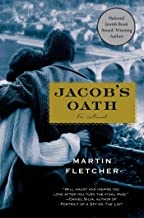Jacob’s Oath - Review
Jacob's Oath
By Martin Fletcher
Thomas Dunne Books; St. Martin's Press. 2013. ISBN: 978-1-250-02761-0.
Hardcover. 323 pages.
Reviewed by Carl Hoffman
The canvas is too large for this love story set against war's dying days
Hundreds, perhaps thousands of books have been written about World War 11. Probably an equal number of books have been written, and are still being written, about the Holocaust. Of particular significance are Holocaust books written by actual survivors, with their value increasing each year as fewer and fewer survivors remain with us to share their dark memories and tell their dramatic stories.
Despite the massive amount of literature, however, one aspect of the subject remains relatively little known and poorly understood: the very last days of the war, and its immediate aftermath. As World War 11 was drawing to a close, some twenty million were on the move, drifting across Europe in all directions. These included liberated prisoners of war, soldiers of defeated armies, civilian populations made homeless by the war's wholesale destruction of their cities and towns, people fleeing the Russian advance—frantically heading westward to areas being liberated by the Americans and the British, and other refugees of virtually every nationality in Europe.
Today, historians, political scientists, journalists and others are trying to understand the events of those days, involving everything from what happened to Holocaust survivors at the end of the war to the behavior of the Soviet Red Army as its vengeful soldiers swept across central Europe, and Stalin gained control of the areas ceded to him by Roosevelt and Churchill at Yalta.
The good news today is that Martin Fletcher, one of television's most highly respected news correspondents, has written a book, Jacob's Oath, that focuses on this extremely important, yet little understood period in recent world history. The bad news is that he has chosen to do so in the format of a novel.
Fletcher examines the immediate post-war European world through the eyes of a handful of fictional characters. Like James Michener, Fletcher concocts individual men and women to represent larger groups and social currents. Fletcher is a better writer than Michener was, with a good ear for dialogue and a sensitive understanding of how real people think, feel and live. Thus, while virtually all of Michener's characters seemed like cardboard cut-outs that never ate, drank, smoked, had sex, or went to the toilet—existing merely to teach us the bits of history that Michener wanted us to know—Fletcher's characters are made of flesh and blood.
So, we meet Jacob, liberated from Auschwitz and making his way back home to Heidelberg to kill Hans, the concentration camp guard who murdered his brother. We also meet Hans, the concentration camp guard. We are then introduced to Sarah, who spent the war hiding in Berlin cellars and basements and is also returning to Heidelberg, in the hopes of finding her husband who, she later learns, is dead. She, like Jacob, are among what Fletcher eloquently refers to as the thousands of "homing pigeons without a home"—Jews trying to return to homes that have either been destroyed, or more likely, taken over and occupied by their pre-war Gentile neighbors. Sarah is helped by Isak, a friendly officer in the Red Army, who is also Jewish.
Jacob and Sarah find their separate ways back to Heidelberg, meet and fall in love. They must now choose between starting a new life together or letting Jacob go ahead with his plan to kill Hans and risk either being killed or arrested himself. At the same time, we meet the members of a hit team of young Jews from the British army's Jewish Brigade, who are going around quietly assassinating SS officers—both male and female—hiding out throughout post-war Germany. They soon realize, however, that they too must choose between using their skills and training to kill Nazis in Germany or helping to build a new Jewish homeland in Palestine. The lives of all of these characters become increasingly intertwined as the story unfolds, with all of them ultimately having to choose between a dark past and a hopefully brighter future, and between hate and love.
Martin Fletcher is a good writer and a talented storyteller, but the period he is examining and the issues with which he is dealing are simply too much for a novel, or at least for the novel he has written. Fletcher's characters, however much they are intended to represent larger issues, are just too small to convey the significance of the events of those years. While I believe that I am as romantic as the proverbial "next guy", I simply found myself impatient and in fact totally bored with Jacob and Sarah's burgeoning love affair. Through the unnecessarily long passages detailing their affectionate dialogue and life-affirming lovemaking, I found myself constantly wanting to shout, "Okay, Great. Now tell me what's going on outside, in the rest of Germany and the world!"
But that's just me.








Comments